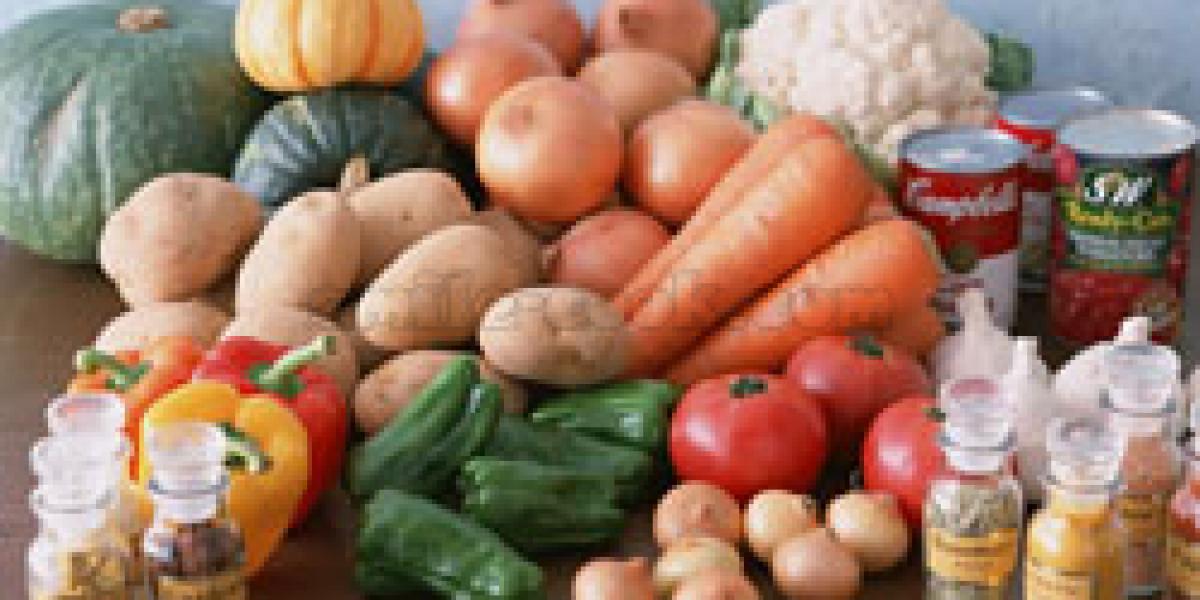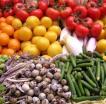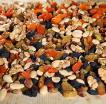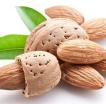Hidden harms of ten healthy foods
 Some foods are considered a priori healthy and many people eat them assiduously to “stock up on the benefits ahead”. However, even seemingly safe tomatoes destroy teeth and are contraindicated for people of age. Therefore, foods that are considered healthy, but can be harmful to health, can be considered dangerous food.
Some foods are considered a priori healthy and many people eat them assiduously to “stock up on the benefits ahead”. However, even seemingly safe tomatoes destroy teeth and are contraindicated for people of age. Therefore, foods that are considered healthy, but can be harmful to health, can be considered dangerous food.
In order to stay healthy, a person not only has to exercise and give up bad habits, but also carefully monitor what he or she eats. Doctors, environmentalists and the staff of “knife and fork” diligently recommend to eat only “healthy” foods and avoid ”harmful and dangerous” foods. But is what we are advised to eat so safe?
Let's take the top ten most common “healthy” foods and see what they are doing to us.
Green tea. Green tea contains polyphenol oxidase, an antioxidant substance that prevents free radicals from damaging cells and prevents inflammation of blood vessels. Indeed – a very beneficial product. Studies have shown: in order for the health-promoting effect of green tea to be noticeable, it is necessary to drink at least 6-10 cups of tea a day. In this case, green tea can not be called a panacea in any way. Because studies by the John Innes Center from the University of Murcia (Spain) have shown that green tea interferes with the absorption of folic acid, necessary for the normal development of the fetus in pregnant women, and therefore increases the risk of birth defects of the newborn, if a woman uses this drink during conception or pregnancy. And the danger occurs if only 2-3 cups of tea a day are consumed.
And researchers from the State University of New Jersey found that too large doses of green tea can cause liver and kidney disease. With intensive use of the invigorating drink in the body increases the amount of polyphenols that cause negative changes in the liver. The dose at which green tea consumption becomes dangerous is 2 regular European cups a day.
Fish. Sea fish, which contains omega-3 polyunsaturated fatty acids that slow the development of atherosclerosis and reduce the risk of heart attack, has been recommended by doctors to patients for about 20 years, and it is recommended to eat it at least a couple times a week. Or take fish oil in capsules. In addition, fish contains a huge amount of useful minerals. In particular, iodine, which affects the reduction of cholesterol, and manganese, which contributes to the formation of insulin, reducing blood sugar levels. And mercury... which has no beneficial effect on the human body, and its content in fish, alas, grows from year to year, along with the level of pollution of the world's oceans. And a large-scale study of more than 3,000 men, conducted by researchers from the Faculty of Medicine at the University of East Anglia, showed an increase in mortality in those who took fish oil capsules. Moreover, according to the latest data, scientists have not been able to prove the benefits of consuming omega-3 fatty acids. In addition, if there are problems with the pancreas, it is simply harmful to use them, and overdose threatens serious problems with the adrenal glands.
Blueberries and pomegranate. They have high antioxidant properties, protecting the brain and reducing the risk of clogged arteries and atherosclerosis. The red-purple juice of the blueberry is useful in anemia, cystitis, leukoplakia and as a sedative. Morses made from it are taken with fever. However, it should be borne in mind that the berries of blueberries growing near thickets of marsh fen, can “absorb” in itself and accumulate in the grayish plaque poisonous essential oil of the fen, which causes a severe headache, nausea and vomiting.
Pomegranate juice is recommended to drink in case of exhaustion, anemia, atherosclerosis, respiratory infections, bronchial asthma and sore throat. However, it is categorically contraindicated in peptic ulcer disease and gastritis with high acidity of gastric juice. Drink it only diluted with water, otherwise the acids contained in it will not only irritate the stomach, but can also corrode the enamel of the teeth. In addition, it has a hardening property, so it is contraindicated for those who have problems with the digestive system.
Olive oil. Olive oil contains all the same antioxidants, the useful properties of which were listed above. At the same time, it has the ability to reduce blood cholesterol levels and protects people from the threat of atherosclerosis. Olive oil of cold, first pressing is considered the most useful of all oils, but do not forget that a tablespoon of both butter and olive oil contains 110 calories, and when used in large quantities (it is often recommended to drink at least 100 grams of this oil daily), it can easily help to gain extra pounds. In addition, olive oil is not so easy to choose correctly, because it is useful oil of the first, cold-pressed, but the so-called “orujo”, which is obtained by heating the pomace, categorically should not be used, as it contains harmful carcinogenic substances such as benzopyrene, because of which low-grade oil “orujo” is banned in Europe.
Nuts – walnuts, almonds, pine nuts, macadamia nuts. These nuts help limit sugar and cholesterol intake, are recommended for heart disease and inflammation, and contain antioxidants and omega-3 fatty acids. Nuts are also useful in anemia, such as walnuts, because they contain iron and cobalt compounds. But walnuts are harmful in coughs, bronchitis, acute respiratory infections, sore throat, diathesis, urticaria, eczema, psoriasis and neurodermatitis. And contraindicated in gastritis, colitis, enterocolitis, gastric and duodenal ulcers. And excessive consumption of nuts can cause headache, vomiting or even poisoning. All nuts are characterized by a high content of protein and especially fat, so they are quite caloric. In addition, nuts are susceptible to fungal diseases that can lead to the growth of toxic substances harmful to humans, and are often carriers of pest larvae, such as the capra beetle. And nuts are also a strong allergen and should be consumed very carefully and in small quantities, especially the first time.
Nuts are also a strong allergen and should be consumed very carefully and in small quantities, especially the first time.
Whole grains – oats, wheat, barley. They help stabilize blood sugar levels and improve the functioning of blood vessels and reduce the chances of inflammation. Whole grains contain a large amount of fiber. Such a grain consists of three main parts – bran, sprouts and endosperm. Processed flour is cleaned of bran and sprouts, along with which fiber and other nutrients leave. However, for all the pluses in the use of whole grains has its minuses – an overabundance of vegetable fiber negatively affects the intestinal microflora and is not recommended for people who have an open stomach ulcer. Some varieties of whole grains can be harmful for people with digestive difficulties, as this food is quite hard to digest, and in the elderly, too much fiber can cause increased gas or upset stomach.
At the same time, whole grains can also be harmful for people with digestive problems, as this food is quite hard to digest, and in the elderly, too much fiber can cause increased gas or upset stomach.
Red grapes thanks to the large amount of antioxidants and polyphenols contained in it, helps to improve blood composition and increase hemoglobin levels, has a beneficial effect on the heart, preventing the formation of blood clots. In addition, grapes have antioxidant, antitumor and anti-inflammatory effects. However, the polyphenols and tannins present in red grapes can cause migraines from which there is virtually no escape, and the contaminants on the skin – yeast fungi and molds, harmful substances from polluted air and pesticide residues – are even more dangerous.
These grapes can cause a migraine, from which there is virtually no escape.
These grapes can also be used to prevent the formation of blood poisoning.
Garlic and onions, are thought to carry a number of sulfur-containing compounds that protect against heart disease and some cancers. Recent studies have shown that garlic and onions do not reduce harmful cholesterol levels in the body, and therefore do not prevent cardiovascular disease. Instead, they cause irritation of the mucous membranes, heartburn and scare away with their pungent, characteristic odor. Garlic and onions should never be eaten with peptic ulcer and duodenal ulcer, acute gastritis or exacerbation of chronic gastritis, inflammatory kidney disease. In addition, it is dangerous to eat garlic together with aspirin or any other anticoagulant, because it promotes blood thinning.
Broccoli contains substances that help prevent cancer and also strengthens memory. In people with hyperacidity and pancreatic disease, it can cause abdominal bloating and cramping.
Broccoli contains substances that help prevent cancer, and it also strengthens memory.
BroccoliTomatoes contain lycopene, a powerful antioxidant, help stimulate the immune system and protect against some cancers, especially prostate. But in addition to lycopene, tomatoes are rich in calcium and are strongly contraindicated for the elderly and those with osteoporosis and other joint problems. Since the increased use of tomatoes and tomato pastes, sauces, leads to the accumulation of calcium and salt deposits in the body and causes the formation of kidney stones, and also contributes to erosion of tooth enamel. Tomatoes, and more specifically, the acids they contain, are harmful in cholelithiasis – because they can cause spasm of the gallbladder.



